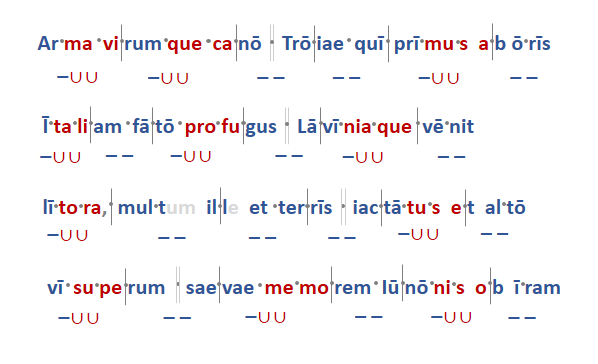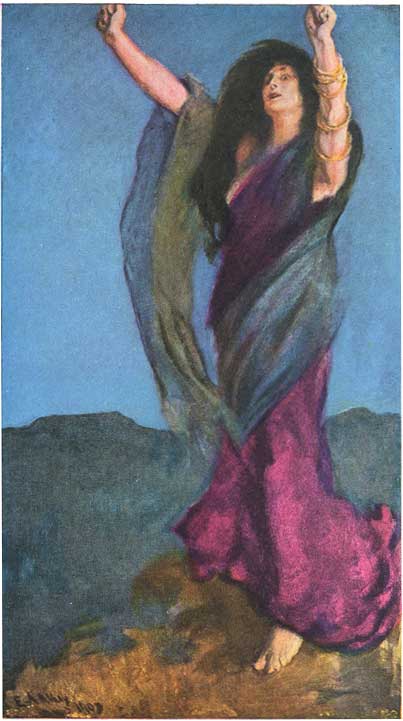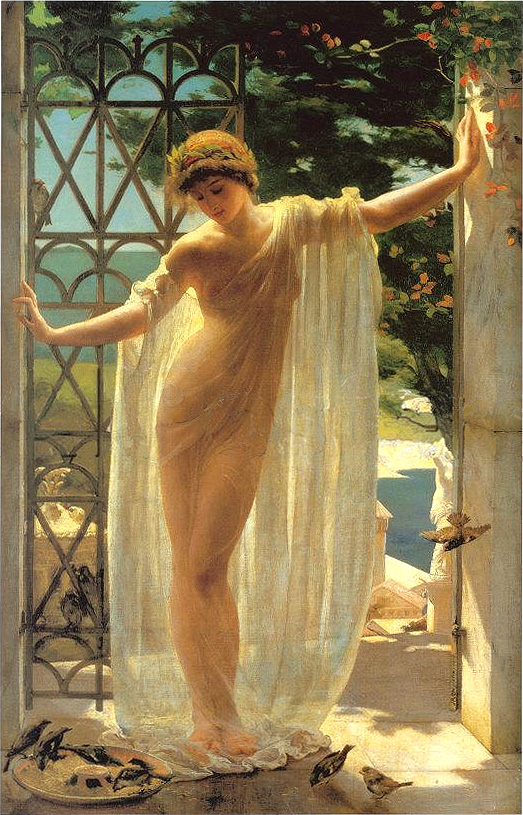|
Spondee
A spondee (Latin: ) is a metrical foot consisting of two long syllables, as determined by syllable weight in classical meters, or two stressed syllables in modern meters. The word comes from the Greek , , 'libation'. Spondees in Ancient Greek and Latin Libations Sometimes libations were accompanied by hymns in spondaic rhythm, as in the following hymn by the Greek poet Terpander (7th century BC), which consists of 20 long syllables: "Zeus, Beginning of all things, Leader of all things, Zeus, I make a libation to Thee this beginning of (my) hymns." In hexameter poetry However, in most Greek and Latin poetry, the spondee typically does not provide the basis for a metrical line in poetry. Instead, spondees are found as irregular feet in meter based on another type of foot. For example, the epics of Homer and Virgil are written in dactylic hexameter. This term suggests a line of six dactyls, but a spondee can be substituted in most positions. The first line of Virgil's ... [...More Info...] [...Related Items...] OR: [Wikipedia] [Google] [Baidu] |
Prosody (Latin)
Latin prosody (from Middle French ''prosodie'', from Latin ''prosōdia'', from Ancient Greek προσῳδία ''prosōidía'', 'song sung to music', 'pronunciation of syllable') is the study of Latin poetry and its laws of meter. The following article provides an overview of those laws as practised by Latin poets in the late Roman Republic and early Roman Empire, with verses by Catullus, Horace, Virgil and Ovid as models. Except for the early Saturnian (poetry), Saturnian poetry, which may have been accentual, Latin poets borrowed all their verse forms from the Greeks, despite significant differences between the two languages. Latin verse: a Greek gift A brief history The start of Latin literature is usually dated to the first performance of a play by Livius Andronicus in Rome in 240 BC. Livius, a Greek slave, translated Greek New Comedy for Roman audiences. He not only established the genre fabula palliata, but also adapted meters from Greek drama to meet the needs of Latin ... [...More Info...] [...Related Items...] OR: [Wikipedia] [Google] [Baidu] |
Dactylic Hexameter
Dactylic hexameter is a form of meter used in Ancient Greek epic and didactic poetry as well as in epic, didactic, satirical, and pastoral Latin poetry. Its name is derived from Greek (, "finger") and (, "six"). Dactylic hexameter consists of six feet. The first five feet contain either two long syllables, a spondee (– –), or a long syllable followed by two short syllables, a dactyl (–ᴗᴗ). However, the last foot contains either a spondee or a long syllable followed by one short syllable, a trochee(– ᴗ). The six feet and their variation is symbolically represented below: The hexameter is traditionally associated with classical epic poetry in both Greek and Latin. Consequently, it has been considered to be ''the'' grand style of Western classical poetry. Examples of epics in hexameter are Homer's ''Iliad'' and ''Odyssey'', Apollonius of Rhodes's ''Argonautica'', Virgil's ''Aeneid'', Ovid's ''Metamorphoses'', Lucan's ''Pharsalia'', Valerius Flaccus's ''Argona ... [...More Info...] [...Related Items...] OR: [Wikipedia] [Google] [Baidu] |
Poetry
Poetry (from the Greek language, Greek word ''poiesis'', "making") is a form of literature, literary art that uses aesthetics, aesthetic and often rhythmic qualities of language to evoke meaning (linguistics), meanings in addition to, or in place of, Denotation, literal or surface-level meanings. Any particular instance of poetry is called a poem and is written by a poet. Poets use a variety of techniques called poetic devices, such as assonance, alliteration, Phonaesthetics#Euphony and cacophony, euphony and cacophony, onomatopoeia, rhythm (via metre (poetry), metre), and sound symbolism, to produce musical or other artistic effects. They also frequently organize these effects into :Poetic forms, poetic structures, which may be strict or loose, conventional or invented by the poet. Poetic structures vary dramatically by language and cultural convention, but they often use Metre (poetry), rhythmic metre (patterns of syllable stress or syllable weight, syllable (mora) weight ... [...More Info...] [...Related Items...] OR: [Wikipedia] [Google] [Baidu] |
Aeneid
The ''Aeneid'' ( ; or ) is a Latin Epic poetry, epic poem that tells the legendary story of Aeneas, a Troy, Trojan who fled the Trojan War#Sack of Troy, fall of Troy and travelled to Italy, where he became the ancestor of the Ancient Rome, Romans. Written by the Roman poet Virgil between 29 and 19 BC, the ''Aeneid'' comprises 9,896 lines in dactylic hexameter. The first six of the poem's twelve books tell the story of Aeneas' wanderings from Troy to Italy, and the poem's second half tells of the Trojans' ultimately victorious war upon the Latins (Italic tribe), Latins, under whose name Aeneas and his Trojan followers are destined to be subsumed. The hero Aeneas was already known to Greco-Roman legend and myth, having been a character in the ''Iliad''. Virgil took the disconnected tales of Aeneas' wanderings, his vague association with the foundation of Ancient Rome, Rome and his description as a personage of no fixed characteristics other than a scrupulous ''pietas'', ... [...More Info...] [...Related Items...] OR: [Wikipedia] [Google] [Baidu] |
Iambic Pentameter
Iambic pentameter ( ) is a type of metric line used in traditional English poetry and verse drama. The term describes the rhythm, or meter, established by the words in each line. Meter is measured in small groups of syllables called feet. "Iambic" indicates that the type of foot used is the iamb, which in English is composed of an unstressed syllable followed by a stressed syllable (as in ''a-BOVE''). "Pentameter" indicates that each line has five metrical feet. Iambic pentameter is the most common meter in English poetry. It was first introduced into English by Chaucer in the 14th century on the basis of French and Italian models. It is used in several major English poetic forms, including blank verse, the heroic couplet, and some of the traditionally rhymed stanza forms. William Shakespeare famously used iambic pentameter in his plays and sonnets, John Milton in his ''Paradise Lost'', and William Wordsworth in '' The Prelude''. As lines in iambic pentameter usually c ... [...More Info...] [...Related Items...] OR: [Wikipedia] [Google] [Baidu] |
Dido
Dido ( ; , ), also known as Elissa ( , ), was the legendary founder and first queen of the Phoenician city-state of Carthage (located in Tunisia), in 814 BC. In most accounts, she was the queen of the Phoenician city-state of Tyre (located in Lebanon) who fled tyranny to found her own city in northwest Africa. Known only through ancient Greek and Roman sources, all of which were written well after Carthage's founding, her historicity remains uncertain. The oldest references to Dido are attributed to Timaeus, who lived in Taormina in Sicily, and died around 260 BC, which is about five centuries after the date given for the foundation of Carthage. Timaeus told the legends surrounding the founding of Carthage by Dido in his Sicilian ''History''. By his account, Dido founded Carthage in 814 BC, around the same time as the foundation of Rome, and he alluded to the growing conflict between the two cities in his own day. Details about Dido's character, life, and role in the fo ... [...More Info...] [...Related Items...] OR: [Wikipedia] [Google] [Baidu] |
John Masefield
John Edward Masefield (; 1 June 1878 – 12 May 1967) was an English poet and writer. He was Poet Laureate of the United Kingdom, Poet Laureate from 1930 until his death in 1967, during which time he lived at Burcot, Oxfordshire, near Abingdon-on-Thames. Among his best known works are the children's novels ''The Midnight Folk'' and ''The Box of Delights'', and the poems "The Everlasting Mercy" and "Sea-Fever". Shortly after his death his house (Burcote Brook) burned down and was later replaced by a Cheshire Home named after him. Biography Early life Masefield was born in Ledbury in Herefordshire to George Masefield, a solicitor, and his wife Caroline (née Parker). He was baptised in the Church at Preston Cross, just outside Ledbury. His mother died giving birth to his sister when Masefield was six, and he went to live with his aunt. His father died soon afterwards, following a mental breakdown.David Gervais.Masefield, John Edward, in ''Oxford Dictionary of National Biography ... [...More Info...] [...Related Items...] OR: [Wikipedia] [Google] [Baidu] |
Alexander Pope
Alexander Pope (21 May 1688 Old Style and New Style dates, O.S. – 30 May 1744) was an English poet, translator, and satirist of the Age of Enlightenment, Enlightenment era who is considered one of the most prominent English poets of the early 18th century. An exponent of Augustan literature, Pope is best known for his satirical and discursive poetry including ''The Rape of the Lock'', ''The Dunciad'', and ''An Essay on Criticism,'' and for his translations of Homer. Pope is often quoted in ''The Oxford Dictionary of Quotations'', some of his verses having entered common parlance (e.g. "damning with faint praise" or "An Essay on Criticism, to err is human; to forgive, divine"). Life Alexander Pope was born in London on 21 May 1688 during the year of the Glorious Revolution. His father (Alexander Pope, 1646–1717) was a successful linen merchant in the Strand, London. His mother, Edith (née Turner, 1643–1733), was the daughter of William Turner, Esquire, of York. Both pare ... [...More Info...] [...Related Items...] OR: [Wikipedia] [Google] [Baidu] |
Troilus And Cressida
''The Tragedy of Troilus and Cressida'', often shortened to ''Troilus and Cressida'' ( or ), is a play by William Shakespeare, probably written in 1602. At Troy during the Trojan War, Troilus and Cressida begin a love affair. Cressida is forced to leave Troy to join her father in the Ancient Greeks, Greek camp. Meanwhile, the Greeks endeavour to lessen the pride of Achilles. The tone alternates between bawdy comedy and tragic gloom. Readers and theatre-goers have frequently found it difficult to understand how they are meant to respond to the characters. Frederick S. Boas has labelled it one of Shakespeare's Shakespearean problem play, problem plays. It is the subject of lively critical debate. Characters The Trojans * Priam, King of Troy * Priam's children: Cassandra (a prophetess), Hector, Troilus, Paris (mythology), Paris, Deiphobus, Helenus, and Margarelon (bastard) * Andromache, Hector's wife * Aeneas, a commander and leader * Antenor (mythology), Antenor, another comma ... [...More Info...] [...Related Items...] OR: [Wikipedia] [Google] [Baidu] |
Catullus
Gaius Valerius Catullus (; ), known as Catullus (), was a Latin neoteric poet of the late Roman Republic. His surviving works remain widely read due to their popularity as teaching tools and because of their personal or sexual themes. Life Gāius Valerius Catullus was born to a leading equestrian family of Verona, in Cisalpine Gaul. The social prominence of the Catullus family allowed the father of Gaius Valerius to entertain Julius Caesar when he was the Promagistrate (proconsul) of both Gallic provinces. In a poem, Catullus describes his happy homecoming to the family villa at Sirmio, on Lake Garda, near Verona; he also owned a villa near the resort of Tibur (modern Tivoli). Catullus appears to have spent most of his young adult years in Rome. His friends there included the poets Licinius Calvus and Helvius Cinna, Quintus Hortensius (son of the orator and rival of Cicero), and the biographer Cornelius Nepos, to whom Catullus dedicated a '' libellus'' of poems, the ... [...More Info...] [...Related Items...] OR: [Wikipedia] [Google] [Baidu] |
Elegiac Couplet
The elegiac couplet or elegiac distich is a poetic form used by Greek lyric poets for a variety of themes usually of smaller scale than the epic. Roman poets, particularly Catullus, Propertius, Tibullus, and Ovid, adopted the same form in Latin many years later. As with the English heroic couplet, each pair of lines usually makes sense on its own, while forming part of a larger work. Each couplet consists of a dactylic hexameter verse followed by a dactylic pentameter verse. The following is a graphic representation of its scansion: – uu , – uu , – uu , – uu , – uu , – x – uu , – uu , – , , – uu , – uu , – – is one long syllable, u one short syllable, uu is one long or two short syllables, and x is one long or one short syllable ( anceps). The form was felt by the ancients to contrast the rising action of the first verse with a falling quality in the second. The sentiment is summarized in a line from Ovid's ''Amores'' I.1.2 ... [...More Info...] [...Related Items...] OR: [Wikipedia] [Google] [Baidu] |
Ennius
Quintus Ennius (; ) was a writer and poet who lived during the Roman Republic. He is often considered the father of Roman poetry. He was born in the small town of Rudiae, located near modern Lecce (ancient ''Calabria'', today Salento), a town founded by the Messapians, and could speak Greek as well as Latin and Oscan (his native language). Although only fragments of his works survive, his influence in Latin literature was significant, particularly in his use of Greek literary models. Biography Very little is reliably known about the life of Ennius. His contemporaries hardly mentioned him and much that is related about him could have been embroidered from references to himself in his now fragmentary writings. Some lines of the ''Annales'', as well as ancient testimonies, for example, suggest that Ennius opened his epic with a recollection of a dream in which the ancient epic-writer Homer informed him that his spirit had been reborn into Ennius. It is true that the doctrine o ... [...More Info...] [...Related Items...] OR: [Wikipedia] [Google] [Baidu] |






